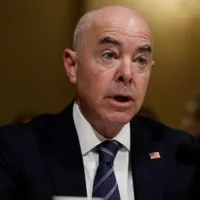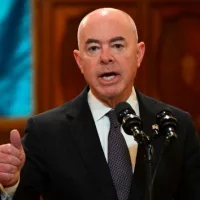
(NEW YORK) — At 21 years old, Texas college student Madi said she was not ready to be a mother.
She was about 10 weeks along when she found out she was pregnant and decided she wanted to have an abortion.
But due to the new Texas law that effectively bans abortions as early as six weeks into pregnancy, Madi’s personal choice turned into an arduous journey, traveling hundreds of miles and crossing state lines for the procedure.
“I’m drowning,” said Madi, who asked to only be identified by her first name. “That’s the best word to describe it, drowning.”
On Sept. 1, the most restrictive abortion law in the country went into effect. Senate Bill 8 bans abortions once cardiac activity is detected and before some women know they are pregnant. Nearly a month later, Madi traveled more than 400 miles to the only abortion clinic left in Mississippi.
She says her story reveals the lengths some women face to have a choice.
“I am a senior in college. I just turned 21 and I would say I’m a pretty typical college kid,” Madi told ABC News. “I am 13 weeks pregnant right now and I’m not in a place to have a baby.”
Madi said she was in a committed relationship and on birth control so her pregnancy was unexpected. She didn’t experience any early pregnancy signs until the nine-week mark, which at the time seemed like the typical stress of being a senior and starting a new semester.
“I had been not sleeping and not eating and nauseous for a few weeks,” said Madi. “So I took one test and it came out a clear plus sign from the beginning. And I was devastated.”
Up until that point, she had been living her life normally, she said.
“I was still living my life as regular and as carefree of a college kid as I could be,” said Madi.
After several positive pregnancy tests, Madi booked an appointment at a Planned Parenthood in Texas.
She said the clinician told her she was measuring 10-and-a-half weeks into her pregnancy — past the mark at which she could still receive the procedure in Texas.
“I just cried. I was heartbroken and terrified,” said Madi. “I immediately knew that any chance I had of being able to have this procedure done in Texas was gone.”
She immediately knew that she wanted to exercise her federal right to choose, despite the new Texas law.
“There aren’t any laws on the books in any state regulating men’s bodies. It’s sexist, it’s unequal and it’s wrong,” said Madi. “My body is not their property.
Madi said she began to research nearby clinics across state lines. She said she called more than 30 clinics, looking for the earliest open appointment.
“I started researching with the materials that Planned Parenthood gave me and looked into Louisiana and Louisiana’s booked out three weeks,” said Madi. “I called Alabama, and Kansas, and Oklahoma, and Vegas, and Georgia.”
The earliest appointment Madi could find in Mississippi was more than 400 miles away.
Jackson Women’s Health is Mississippi’s last abortion clinic and the center of a potentially historic Supreme Court case that could possibly overturn Roe V. Wade.
Clinic director Shannon Brewer has been working at Jackson Women’s Health for two decades. She said the new Texas law isn’t deterring people from getting an abortion, only pushing them to travel out of state for the procedure.
“We’ve been even busier, because now we’re seeing even a lot more patients from Texas,” said Brewer. “We’ve almost doubled our capacity. Our phones are ringing non-stop because of this.”
Madi said it was with the help of her parents that she was able to get the procedure. Her mother, who asked not to reveal her name, said she wasn’t angry at Madi for her situation.
“I’m angry with Governor Abbott,” said Madi’s mother. “I’m angry that men have decided this is what’s best for women.”
Madi and her family had to make two separate trips to Mississippi in order to secure her appointment. Madi said she was grateful for the support through such an emotionally difficult time.
“There were so many emotions going on at once that it was a blur. The anxiety was still there. The frustration was still there. And I think honestly just the fear of the unknown,” said Madi.
“I had to keep in mind that I was doing this for me. This is my future on the line. It’s my body on the line. And it’s a lot to take in,” she added.
ABC News followed Madi on the day of the procedure.
Madi said the staff at Jackson Women’s Health helped put her mind at ease.
Her nurse walked Madi through what would happen during the procedure.
Prior to starting, she explained that Madi would first receive medication and then be asked to wait an hour-and-a-half to let her body prepare for the procedure. While she waited, she said her decision did not waiver.
“It’s my body and it’s my choice,” said Madi at the time. “I don’t think it’s right for people to try and convince others when it’s not their life that’s about to change.”
Madi said she wanted to publicly share her deeply intimate moment to break the stigma around a taboo topic.
“No one talks about this process,” said Madi. “I’m glad that I’m able to kind of shine a light and give people a little bit of that sense of control back that I feel like I’ve been lacking in this process.”
She said that the patient before her helped let her know that she wasn’t alone.
“Waiting for my turn to go into the room was so heavy because you’re sitting there knowing that there’s a girl in there before you,” said Madi. “Watching her come out and seeing that thumbs up from her, that she was doing OK after it, that put a little bit of ease on my nerves.”
During the procedure, Madi said she appreciated that she was able to ask questions and that the clinicians talked her through each step. After the procedure was over, Madi fell into her mother’s arms crying.
“We got in the car, got buckled, and we started making our way to the airport. Got on the flight and I finally slept,” said Madi.
By the time she got home, she learned of a stunning legal development.
On the same day as her procedure, a federal court blocked Texas’ Senate Bill 8 — the law that had forced Madi to go to Mississippi for her procedure in the first place.
But 48 hours later, a federal appeals court allowed the ban to resume while the U.S. Department of Justice appealed the decision.
“To think that this could all, like, be overturned again and it goes back into place …. really scares me,” said Madi when she heard the news.
A federal appeals court ruled Thursday to reject the Justice Department’s decision and let the Texas statue remain in effect amid the ongoing legal challenge. But, following that decision, the Department of Justice announced it plans to ask the U.S. Supreme Court for a ruling to temporarily block the restrictive abortion law.
As the decision likely moves toward the U.S. Supreme Court, the Texas law has become a rallying cry for anti-abortion rights advocates.
Anti-abortion activist Heather Gardner is the executive director of the Central Texas Coalition for Life. Gardner said she has spent a decade training “sidewalk advocates” to pray outside abortion facilities across the country.
Gardner said she acknowledges that some Texans will find ways around the law.
“We’re very well aware that women will go to other states to have abortions,” said Gardner. “We want women to not have to feel so desperate they have to do that.”
Yet Lila Rose, the president of Live Action, said that Senate Bill 8 is still a historic win for the anti-abortion movement.
“It is the most, most legal protection in effect right now across the country for human lives,” said Rose. “I think that Texas law should be an inspiration to other states because they found an enforcement mechanism that allows the lifesaving law to remain in effect.”
Rose added she hopes the Texas law reframes the narrative around abortion.
“Our societal approach to pregnancy and motherhood and seeing that pre-born child as a threat or a risk or an enemy as opposed to a precious member of the human family,” said Rose. “This is exactly what we should be focusing on, as opposed to promoting the death and destruction of children in the womb.”
While the country remains focused on Texas, Brewer said she will continue to fight to keep the doors of her clinic open in Mississippi.
“I just feel good that they’re able to come here. It’s like, as tired as we are sometimes … every day that I get to wake up and [help women], I’m OK,” said Brewer.
While she recovers from her procedure, Madi said she’s sharing her story because she recognizes many women won’t have same emotional and financial support that she had through the process.
“There were so many unneeded obstacles that I managed to get over but many women won’t,” said Madi. “I feel like this entire process of everything has happened for a reason. Everything happens in life for a reason and it’s my chance to speak on it.”
Madi said her story is meant to empower other women in her situation to fight back.
“My biggest thing is making sure that other women know that they’re not alone. If Texas is gonna make this difficult, make it difficult for Texas,” she said. “Don’t go silently and if they need inspiration, I hope I can be that for them.”
Copyright © 2021, ABC Audio. All rights reserved.















